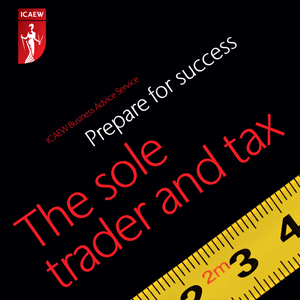The sole trader and tax

When setting up a new business, you have to decide what format your business will take. If you have decided to register as a sole trader, there are some requirements you will need to follow to notify HM Revenue and Customs (HMRC). We explain below why you need to notify HMRC and the tax implications for running your business as a sole trader.
The sole trader and tax
Notify HMRC
You should register for self-assessment at gov.uk/self-assessment-taxreturns.
You can appoint someone to register and send your tax return
for you e.g. a chartered accountant.
You will be issued with a user ID and password which will be needed
when you file your self-assessment tax return. The return allows you
to provide details of your earnings and any other income you get
during the tax year (6 April to 5 April). This information is used to work
out how much income tax and national insurance contributions you
have to pay.
The self-employment self assessment return
You can use a three-line account if your
annual turnover from self-employment
(or income from UK property) is below
the VAT registration threshold (in 2015/16
this is £82,000*). The three-line account is
an easy way of giving HMRC condensed
information about your business’s income
and expenses. Rather than having to
give HMRC a lot of detailed information,
all you need to provide on the relevant
pages of your tax return are:
• details of your business turnover;
• the total of allowable business
expenses, rather than a breakdown of
each expense;
• net profit or loss; and
• details of any adjustments, allowances
or losses (usually detailed in a ‘tax
computation’).
You don’t have to use the three-line
account but most people find this an
easier way of completing their tax
return. If you prefer, you can still give
a breakdown of all your expenses in
the relevant boxes on your tax return.
Businesses below the VAT registration
threshold can also use cash accounting,
so turnover and expenses will be cash
received and payments made in the
period.
Download the full document here
Prepare for business,
prepare for success.
ICAEW Business Advice Service
The ICAEW Business Advice Service (BAS) provides
professional advice for start-ups and owner-run businesses.
As well as practical help online in the form of white papers,
short PDFs and blog articles, we enable businesses to
receive an initial consultation at no charge from an ICAEW
Chartered Accountant.
ICAEW Chartered Accountants are the biggest source
of business advice, reaching over 1.5m businesses from
more than 20,000 offices across the UK.
If you need further help with VAT issues,
a free initial discussion with an ICAEW
Chartered Accountant is a good place to
start. Visit businessadviceservice.com
This leaflet is part of a series.
To find out more see our resources page
